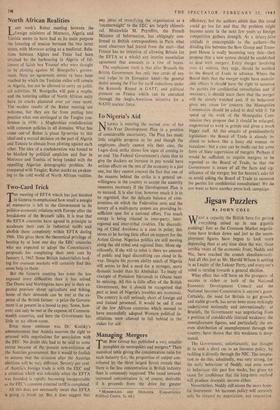Two-Card Trick
THE meeting of EFTA which has just finished in Geneva re-emphasised how small a margin of manoeuvre is left to the Government in its politico-economic relations with Europe after the breakdown of the Brussels talks. It is true that the EFTA countries have agreed in principle to accelerate their cuts in industrial tariffs and abolish them completely within EFTA during 1966. This gives them the theoretical privilege of beating by at least one day the EEC countries who are expected to adopt the Commission's proposals for completing their own cuts by January I, 1967. Some British industrialists look- ing for overseas markets will certainly find this some help to them.
But the Geneva meeting has none the less exposed more difficulties than it has solved. The Danes and Norwegians have put in their ex- pected provisos about agriculture and fishing. Some of their demands can be met at the ex- pense of the British farmer—a price the Govern- ment is at present in a mood to pay. Some, how- ever, can only be met at the expense-of Common- wealth countries, and here the Government has little or no elbow-room.
Even more ominous was Dr. Kreisky's announcement that Austria reserves the right to proceed with negotiations for association with the EEC. No doubt this had to be said to some extent because of the present non-existence of the Austrian government. But it would be foolish to assume that the situation after the Austrian elections will be very different. Seventy per cent.
of Austria's foreign trade is with the EEC and a situation which was tolerable when the EFTA was founded is rapidly becoming insupportable as the EEC's common external tariff is completed. All this does not necessarily mean that EFTA is going to break up. But, it does suggest that any ideas of revivifying the organisation as a 'counterweight' to the EEC are largely chimeri- cal. Meanwhile M. Peyrefitte, the French Minister of Information, has obligingly con- firmed to British correspondents in Paris what most observers had feared from the start—that France has no intention of allowing Britain (or the EFTA as a whole) any interim association agreement that amounts to a row of beans.
The unpleasant truth is that after Brussels the British Government has only two cards of any real value in its European hand—the general desire among the Five for tarifl reductions under the Kennedy Round in. GATT; and political pressure on France which can be exercised through the Anglo-American initiative for a NATO nuclear force.


































 Previous page
Previous page